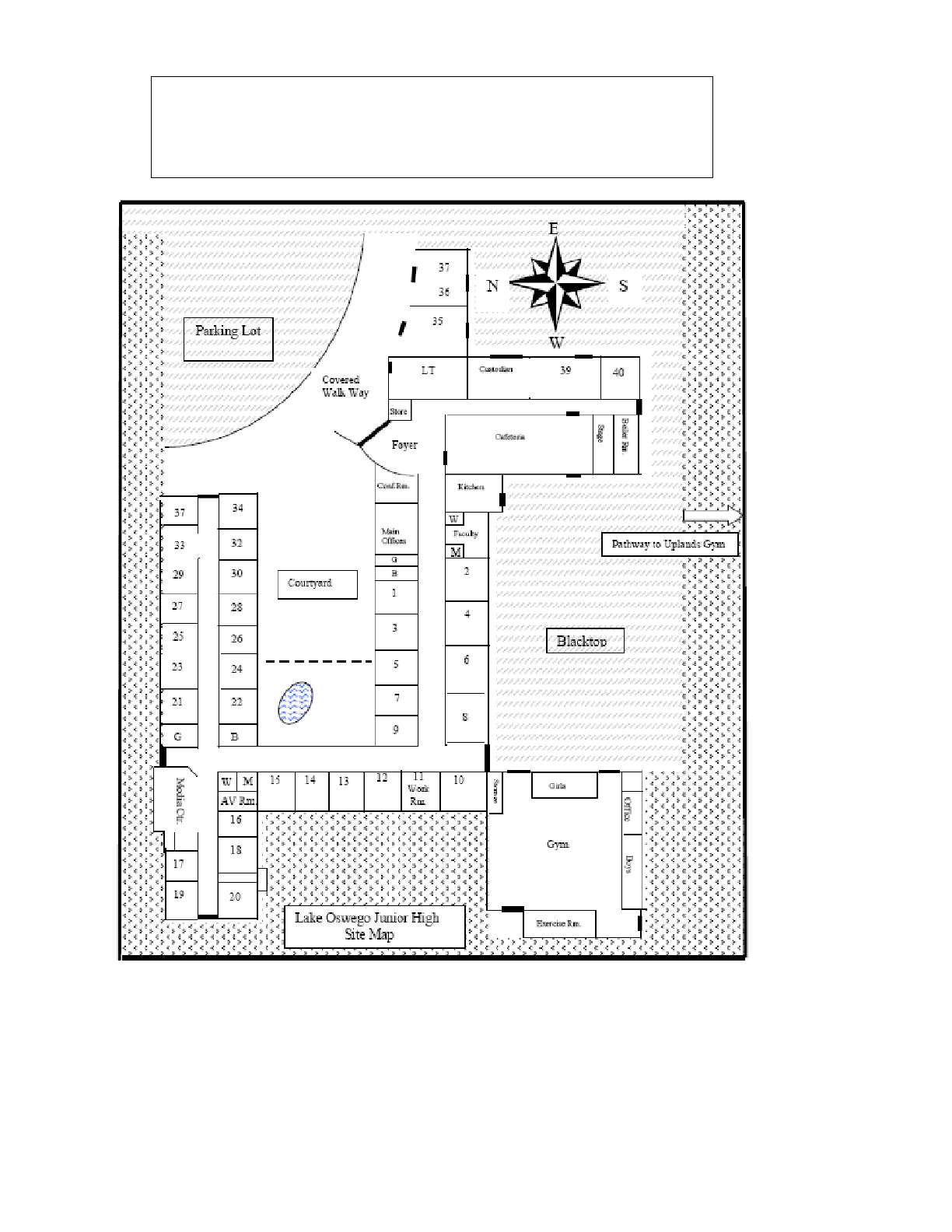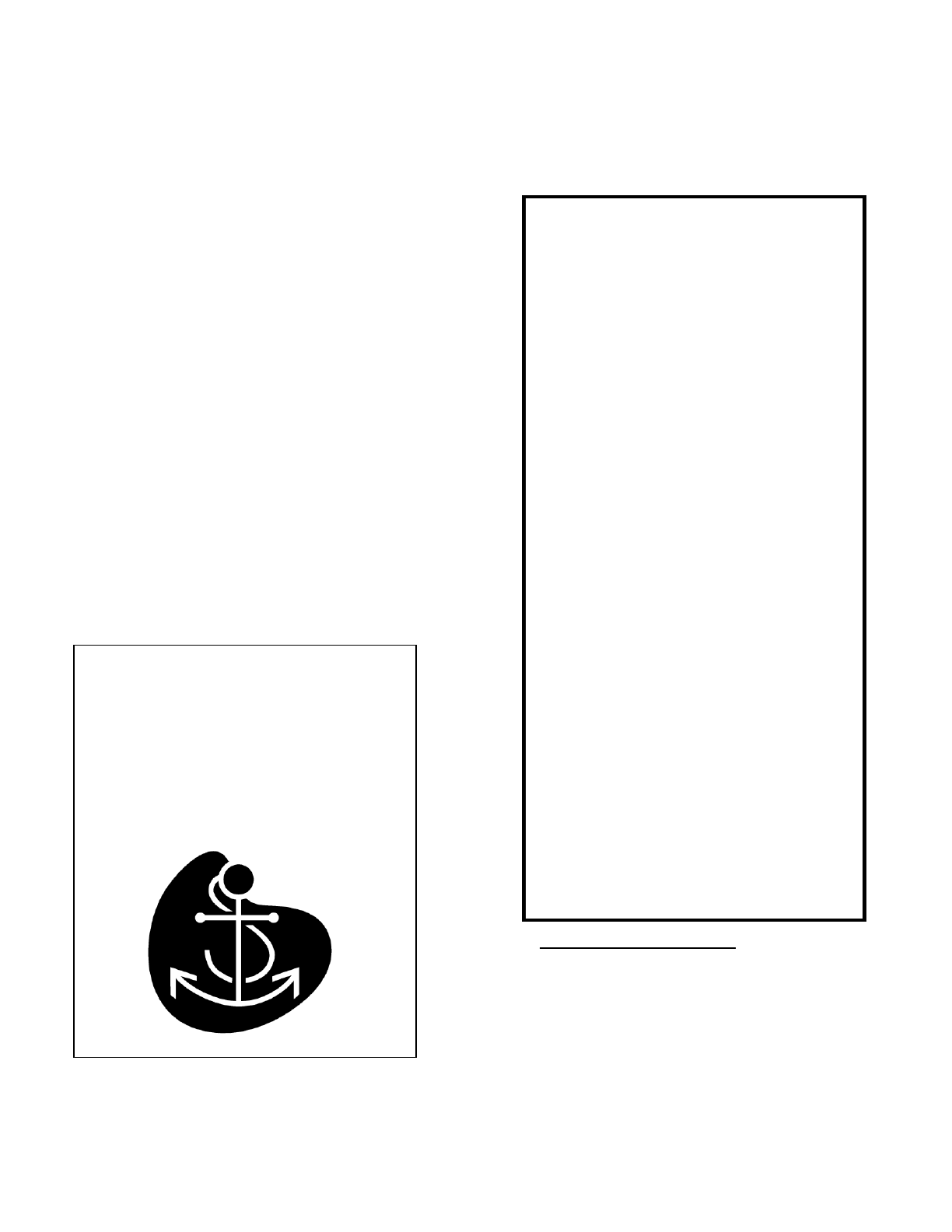
1
Lake Oswego
Junior High School
STUDENT PLANNER
LAKE OSWEGO JUNIOR HIGH SCHOOL
2500 SW Country Club Road, Lake Oswego, OR 97034
(503) 534-2335 Fax: (503) 534-2341
Administrative Staff:
Mr. Kevin Mills, Principal [email protected]
Mr. Jeff Giberson, Assistant Principal [email protected]
Student/Teacher Support Staff:
Counseling Staff:
Ms. Molly Healy, 6
th
grade and 7
th
grade A-D counselor, [email protected]
Mrs. Emily Gillard, 7
th
grade E-R counselor, [email protected]
Mrs. Carrie Trullinger, 8
th
grade and 7
th
grade S-Z counselor, trullinc@loswego.k12.or.us
Office Support Staff:
Mrs. Connie Sturm, Principal’s Secretary, [email protected]
Mrs. Marie Shakerin, Student Registration/Data Processor, [email protected]
Mrs. Eileen Christopher, Student Attendance/Fees, [email protected]
Please visit our school website for additional information about LOJ:
https://losdschools.org/loj
This agenda belongs to:
Name: ______________________________________
Grade: __________ Locker: _______________
Team: ______________________________________

2
Lake Oswego Junior High
Campus Map

3
Welcome to LOJ
The following important information may
help you become a better student and
enjoy your time here.
✓ Keep a positive attitude.
✓ Good manners are welcomed
everywhere!
✓ Be in class on time and with all of your
supplies.
✓ Always write assignments in your
planner.
✓ Ask your teachers for help when you do
not understand a lesson or assignment.
✓ Do your homework PROMPTLY and use
your class time wisely.
✓ Talk to your parent, teacher, counselor
or administrator if you have a personal or
school related problem.
AND…
✓ “Live” our Anchor Values!
LOJ is a CLOSED Campus: This Means:
♦ You do not leave the school premises
during the school day unless approved
by the office personnel and a parent.
♦ During lunch you remain within the
cafeteria, the gym, the basketball
blacktop area, and the PE field.
LOJ ANCHOR VALUES:
Respect
Responsibility
Safety
Location Guide
Anchor Values 3
Academic Honesty Policy 15-16
Academic Information 5
Assembly Behavior 12
Athletics 4
Attendance Policy 6
Cafeteria Guidelines 11
Campus Map 2
Cell Phones 10
Computer Use 13
Counseling 7
Dress Guidelines 13
Emergencies 7
Food Services 11
Fines & Fees 9
Illness & Injuries 7
Late Work 5
Lockers 9
Nuisance Items 14
Recognition 4
Sporting Events 12
Standard Paper Format 17-18
Staying After School 10
Student Activities 4
Tardy Policy 6
Technology 10
Textbooks 9
Transportation 8
Visitors 10

4
STUDENT RECOGNITION
Student of the Year (SOY)
By doing well in these four areas:
♦ Academics Citizenship
♦ Service Attitude
Teachers may nominate you for Student of
the Year. Each grade level team selects
four students at the end of the year to
receive this award.
End of Year Awards Assembly
There will be assemblies at the end of the
year to honor student effort, attitude and
achievement at LOJ.
Amazing Sailors
These students are highlighted in our front
lobby with photos and short stories about
the amazing things they are doing outside of
school. Students may be nominated by their
teacher, parents or friends
STUDENT LEADERSHIP
Leadership Classes
Leadership is a 7
th
and 8
th
grade trimester
elective.
DRAMA,
All LOJ students are invited to audition for
the LOJ yearly no-cut musical. There is
room for everyone to be on stage or work
behind the scenes. There is also a drama
once a year where auditioning students may
get cast in a role or can work behind the
scenes.
INTERSCHOLASTIC ATHLETICS
Fall Season: Volleyball
Cross Country
Winter Season: Basketball
Wrestling
Spring Season: Track
Students participating in interscholastic
athletics are required to:
♦ Pay a fee for each sport to Lake
Oswego Community:
https://losdschools.org/domain/464
♦ Have a physical exam given by a
licensed physician. The doctor must
complete and sign an “Athletic
Clearance” form, which will be kept
on file at the school. (Forms available
on our website.)
All the above must be completed before you
may attend practice or a competition.
In order to participate in athletic events,
students must attend school the day of
the event.
CELEBRATIONS
Mixers: Several times a year we hold
mixers before the end of the school day.
Students can dance, go to the library, or
participate in other student generated activities.
8
th
Grade Celebration: There is an end-of-the-
year event that includes a trip off campus during
the school day.
Student Activities

5
ACADEMICS
Progress Reports:
Parents are encouraged to go to their Synergy
ParentVue account to check on their student’s
academic progress. Teachers update mid
Trimester to give a clear picture of student
progress.
Grading:
Your grade indicates progress in gaining subject
information, acquiring skills and abilities, and
accomplishing the required tasks. Academics
are graded as follows:
A = Excellent Work D = Minimum Passing
B = Above Average F = Failing
C = Average I = Incomplete
Late Work:
At LOJHS we believe that homework and
classwork are important parts of our educational
process and work ethic; that there is a value in
turning in work on time.
All late work practices will be written and
communicated to you and your parents during
the first week of school by your teacher.
Response to Intervention-RTI:
Students meet in Advisory classes 3 times a
week. During this time students might be
assigned to a Closed Session if:
Teacher needs to revisit a concept or
skill related to their most recent
instruction
Student is given a chance to improve
their understanding of an essential skill
Student was absent and needs to
receive instruction, make up an
assignment or exam
Student would benefit from some pre-
teaching of the skills in the coming unit.
Open Sessions are designed as places to get
additional help with homework, to improve upon
an assignment for a higher score, to study for an
upcoming assessment with a teacher’s
guidance, or to simply be a place to get some
work completed.
Homework:
Homework is an important part of your
education. At LOJHS we have student
expectations regarding homework:
● To develop your level of responsibility
● To demonstrate learned skills and
creativity
● To engage in a thoughtful intellectual
process
● To arrange a conference with your
teachers when help is needed with
assignments
Collection of Work/Portfolios:
Throughout the year, you will place your
schoolwork in your portfolios. You will present
this work to your parents to show your progress
throughout the school year. Completing your
assignments is key to having a complete
portfolio to show your parents.
School Wide Spirit Weeks & Mixers
The middle school experience promotes academic
learning along with socialization. We believe spirit
weeks and mixers allow time for experiences that
are fun and age appropriate. During these events,
students are expected to:
Follow our Anchor Values:
Be Respectful
Be Responsible
Be Safe
If students behave accordingly during spirit weeks
and mixers, others may be planned. Student
behavior determines future activities. Have fun….
But make good choices!

6
If you are ill or there is an emergency:
● Your parent should call the office as
soon as possible at 503-534-2453
● If your parent does not call, bring a note
when you return to school
● Check in at the attendance desk the day
you return to school
● If you’re unable to attend school check
Edline or email your teachers for works
you have missed.
● Homework for planned absences must
be collected by the student.
Whenever you leave school during the
day:
● Bring the written permission note to the
attendance personnel BEFORE school.
● Obtain an EARLY DISMISSAL SLIP
● Show the slip to your teacher.
● A parent must sign you out in the
office.
Whenever you arrive at school late or
return from an appointment, check in at
the attendance desk and…
● Sign-in at the attendance desk
● Obtain an ADMIT SLIP
Attendance
CHECK-OUT PROCEDURES
DURING SCHOOL
CHECK-IN
PROCEDURES
DURING SCHOOL
ABSENCES

7
Guidance and Counseling
Counseling Website:
https://or01813384.schoolwires.net/domain/1519
As growing young adults, it is important to
assume the responsibility for solving various
problems on your own. We at LOJHS
understand this, but do not expect students
to solve everything alone. Some situations
are too difficult, complex, or unsafe. Your
counselor is available to help you in these
situations. You may meet with your
counselor any time during the day by
making an appointment.
Counselors offer support for students
in the areas of self-esteem, stress
management, friendship problems,
separation and loss, conflict resolution,
academic success, questions about your
classes and other personal concerns.
Illness and Injury
If you are injured in class, you should tell
the teacher at once.
If you are injured on the school grounds,
you should report it to your coach,
supervising teacher, office personnel, or
nearest adult IMMEDIATELY. Student
accident insurance may not cover the
treatment of injuries, which are not reported
promptly.
If you become ill at school:
➢ Ask your teacher for a destination slip to
the office.
➢ Check in with the office staff to be
admitted to the health room or to call
home.
➢ Sign-in on the binder when you go to the
health room.
➢ If your parent/guardian approves your
release from school, you will be signed
out of school. If not, you will be asked to
return to class.
Safety Practice Drills
The following safety concerns have mandated practice schedules for the students to
drill throughout the school year:
Fire
Earthquake
Lockdown
Lock In
If there is a fire, fire drill, or a need to evacuate the building, a loud buzzer will sound in the
halls. Students are to pay close attention to the adult in charge. Students and staff will
exit the building in an orderly fashion, quickly, quietly, and with NO RUNNING, through the
emergency exit assigned to each classroom. Remain in the designated area away from the
building until you receive direction from the adult in charge. DO NOT LEAVE THE SCHOOL
GROUNDS UNLESS YOUR PARENT/GUARDIAN HAS SIGNED FOR YOUR RELEASE.
If there is an earthquake or earthquake drill, duck and cover. Students are to pay
close attention to the adult in charge.
If there is a Lockdown Drill all students and staff are to clear the halls by entering the nearest
room and remain there until the adult in charge gives you directions. Students are to move
quickly, quietly and with NO RUNNING. Students are to pay close attention to the adult
in charge.

8
BUS GUIDELINES
The school district provides bus transportation for
students who live beyond walking distance (a mile
and a half). Rules are posted on each bus, and
students are expected to abide by them. Students
who fail to obey the driver or bus rules may forfeit
their privilege to ride the bus. Students who do not
ride the bus are expected to leave campus after
school is out unless participating in an after
school activity.
1. OAR 581-53-010 "Rules Governing Pupils
Riding School Buses" must be adhered to:
a. Pupils being transported are under
authority of the bus driver.
b. Fighting, wrestling, or boisterous
activity is prohibited on the bus.
c. Pupils shall use the emergency door
only in case of emergency.
d. Pupils shall be on time for the bus
both morning and evening.
e. Pupils shall not bring animals,
firearms, weapons, or other potentially
hazardous material on the bus.
f. Pupils shall remain seated while the
bus is in motion.
g. Pupils may be assigned seats by the
bus driver.
h. When necessary to cross the road,
pupils shall cross in front of the bus or as
instructed by the bus driver.
i. Pupils shall not extend their hands,
arms or heads through bus windows.
j. Pupils shall have written permission
to leave the bus at stops other than home or
school.
k. Pupils shall converse in normal
tones; loud and vulgar language is
prohibited.
l. Pupils shall not open or close
windows without permission of driver.
m. Pupils shall keep the bus clean and
must refrain from damaging it.
n. Pupils shall be courteous to the
driver, to fellow pupils, and to passers-by.
o. Pupils who refuse to obey the
directions of the driver promptly, or refuse to
obey regulations, may forfeit their privilege
to ride on the bus.
If you walk home, use the sidewalks and paved paths
to leave campus. Do not walk in the traffic
area. Walk across the bus loading area at
designated crosswalks only.
If parents or family members are picking you up in a
car… be very alert to moving buses and other cars in
the loading area. Walk across the bus loading area
at designated crosswalks only. The BEST place
to be dropped off or meet your ride in the church
parking lot.
1. Wear your bicycle helmet.
2. Walk your bicycle on the bus ramp.
3. Lock your bicycle with a good locking device.
4. You are not permitted to ride your bicycle during
school hours.
5. The school will take reasonable measures to
assist students in safekeeping of their bicycles.
Damage or a loss of a bicycle should be
immediately reported to the office and the police.
Know your bicycle serial number.
Transportation
WALKING
CARS
BICYCLE
S
SKATEBOARDS
Because of the potential for injury,
students are not allowed to ride
skateboards, scooters. Or rollerblades
on school property (School Board Policy
KGB)

9
It is your responsibility to maintain proper care of
your school hall locker and PE locker.
● Keep your combination to yourself
● Keep your locker locked
● Keep your locker clean and orderly
● Use ONLY your assigned locker
● Do not keep money or valuable items in
lockers
● Do not display any inappropriate materials
in/on your locker
● Do not tamper with anyone else’s locker
● Report any locker problems to the office
immediately!
Misuse of lockers may result in the loss of the
locker privilege.
Students are reminded that giving your locker
combination to other students and/or setting the
locker combination can result in loss of personal
belongings. It is the student’s responsibility to make
sure his/her belongings are securely stowed.
The school, its personnel, and members of the
school board assume no responsibility for items left
in lockers. Lockers may be opened at the discretion
of building administrators, in a prudent way, at an
appropriate time, and in a reasonable manner.
Backpacks are not to be used during the school day.
Use your locker for storage and carry necessary
materials to class. Backpacks should not be taken
to class.
The hallways open each morning at 8:55 AM. If you
need to visit a teacher’s classroom prior to 8:55 AM,
you need to get a pass from the office.
To help prevent textbook problems, students should
remember the following:
● Write your name and the date in each textbook
issued to you.
● When you receive your books, check them
carefully. Take the textbook process seriously.
● It is required that all textbooks have a cover to
minimize damage throughout the year.
● Be careful with your textbooks. Textbooks are
expensive and you will be held responsible for
any damage or loss.
Each student is responsible for all books, locks,
uniforms, and equipment issued to him/her.
Textbook fines:
$10.00 and up = major repair needed. Cover marked
and/or damaged, cover, spine and/or pages torn,
water damage
Full Price = Book cannot be reissued. Pages are torn
out, answers are written in book; inappropriate
words/pictures are written in book. The book issued
to the student is missing.
Lock fines:
$10.00 for each hall or PE lock that is lost
Uniform fines:
$10-$30 each, for each lost or unreturned piece of a
uniform
At the end of each year or when you leave LOJ, you
must return all library and text books, locks, uniforms,
and materials in good condition, or a fine will be
assessed.
Fees:
1. Sports Fee $150.00 per sport
2. Sports Family Fee $500.00 Family Cap
3. Student Body Card $25.00 per student
4. Yearbook Fee $30.00 per student
5. Art Fees $15.00 per trimester
FINES & FEES
General Information
SCHOOL LOCKERS
BACKPACKS
MORNING HALLWAYS
TEXTBOOKS

10
Appropriate Use of Personal
Technology Devices in the
Classroom:
IPads, Kindles, Lap tops
Individual teachers will always have the final
decision for determining if and when a personal
technology device can be used in their
classroom. If a teacher deems use appropriate,
the personal device should be used in a manner
that increases the chances for learning. Use
should add to lesson not detract from it.
Use That Ads to Lesson
● Only applications that are relevant to a
class session should be open. (Browsing
the web, responding to emails,
participating in a social networking sites
would only be allowed if they are the
focus of a particular lesson)
● Keyboards that produce audible sounds
should be disabled prior to entering the
classroom.
● Monitor brightness should be reduced to
an appropriate level so that it is not
distracting to others that may be seated
nearby.
Cell Phones
● All cell phones should be turned off and
out of sight at all times during the school
day unless individual teachers determine
use of cell phones to be appropriate for a
specific lesson.
Confiscated Cell Phone Procedures:
● The FIRST time a cell phone is taken
away for inappropriate use the student
will pick it up from the office at the end of
the day.
● The SECOND time a cell phone is
confiscated, the parents will be
contacted.
Office Telephone:
● An office phone is available for student use.
● Only students attending after school clubs or
who have a prearranged appointment with
teachers are to be in the building.
● If you are a member of an athletic team, you
are to be in the gym area for practice and
games. If you are attending games, you are
to be in the gym area.
● Students waiting for parent/guardians to pick
them up are to wait in the lobby area only.
● Students staying for after school activities
should plan to ride the After School Activity
Bus or make other transportation plans well
in advance. The After School Activity Bus
will leave from the front of LOJ every day
EXCEPT THURSDAY at 5:20pm. It will drop
students off at their neighborhood
elementary feeder school.
● A student shadow day may be arranged with
grade level counselors. Only visits of
prospective LOJ students will be approved.
STAYING AFTER SCHOOL
STUDENT VISITORS

11
NUTRIKIDS
LO Food Services Ticketless
Lunch Program
Payment options:
Online payments at www.myschoolbucks.com
(Student ID number required to set up your child’s
account. ID numbers available from the front
office.
Checks Payable to LOSD – FS
(Please include student name, ID number and
school on memo line or on envelope)
Additional information can be found on the Lake
Oswego School District website:
https://losdschools.org/Page/141
If you have any questions, please call the Food
Service Department at 503 534-2361
Cafeteria Guidelines
● Eat lunch during your assigned lunch period
ONLY.
● Food is to be eaten in the cafeteria only. No food
is allowed in the halls or outside.
● Enter the cafeteria in an orderly fashion.
● Students are to be seated when eating.
LUNCH
There are three lunch periods each day. All 6
th
graders eat A Lunch. 7
th
& 8
th
graders either have B
or C Lunch depending on the teacher they have for
5
th
period.
Lunch Meal Deal
● This includes an entree, a bread item, a serving
of vegetables, a serving of fruit, and a drink.
Dessert is not included.
***You may also purchase a la carte items with
cash or bring a lunch from home.
Food Service

12
Seating Arrangements:
● Enter assemblies with your classroom
teacher leading a single-file line
● Enter quietly and orderly
● Assembly seating is assigned by class
● Sit in your assigned area and/or seat
only
● Do not wander the gym or cafeteria to
find seating with other classes
● Do not save seats
● Remain seated for the entire program
● When the assembly presentation ends
remain seated until the person in
charge dismisses you. Do not stand
up to leave.
Audience Behavior:
● Stop all conversation when the person
in charge begins the assembly
● Remain quiet during the presentations
– conversations during the assembly
presentations are a distraction
● Show your appreciation with applause.
SPORTING EVENTS
Team Players:
● You must attend school on the
days you participate in after school
sports and you must attend
scheduled games and practices
before you attend evening dances
or fundraising events at LOJ.
● Go directly to the gym after school
for practices and/or games. Do
not wander the building.
● You may practice on the fields or
courts only if your team is
scheduled for a game or practice.
● No food or drink is allowed in the
gym. Eat snacks outside.
● At the end of an event, you must
contact the adult in charge if your
transportation arrangements have
changed. Do not leave the event
without first speaking directly with
your coach.
Spectators:
● Sit in the assigned areas.
● Avoid distracting players during
the games. For example, do not
walk or run behind the goals or
baskets during the game.
● Do not use the courts or fields
during breaks. For example, do not
shoot baskets during half time.
● Use appropriate language.
● Be courteous to referees, other
spectators and athletes
● No food or drink in the gym.
● Practices are closed to non-
participants.
Student Conduct
ASSEMBLIES

13
The responsibility for the dress and grooming
of a student rests primarily with the student
and his or her parents or guardians.
Allowable Dress & Grooming
Students must wear clothing including
both a shirt with pants or skirt, or the
equivalent and shoes.
Shirts and dresses must have fabric in
the front and on the sides.
Clothing must cover undergarments,
waistbands and bra straps excluded.
Fabric covering all private parts must
not be see through.
Hats and other headwear must allow the
face to be visible and not interfere with
the line of sight to any student or staff.
Hoodies must allow the student face
and ears to be visible to staff.
Clothing must be suitable for all
scheduled classroom activities including
physical education, science labs, wood
shop, and other activities where unique
hazards exist.
Specialized courses may require
specialized attire, such as sports
uniforms or safety gear.
Non-Allowable Dress & Grooming
Clothing may not depict, advertise or
advocate the use of alcohol, tobacco,
marijuana or other controlled
substances.
Clothing may not depict pornography,
nudity or sexual acts.
Clothing may not use or depict hate
speech targeting groups based on race,
ethnicity, gender, sexual orientation,
gender identity, religious affiliation or
any other protected groups.
Clothing, including gang identifiers, must
not threaten the health or safety of any
other student or staff.
If the student’s attire or grooming
threatens the health or safety of any
other person, then discipline for dress or
grooming violations should be
consistent with discipline policies for
similar violations.
Unacceptable Uses:
→ Illegal activities - Unauthorized access to
the district system, attempts to destroy or
manipulate data, or to
engage in the selling of illegal goods is
unacceptable
→ System security – Avoid the spread of
computer viruses and always check with your
teacher before transferring information
between disks.
→ Inappropriate language – Do not use
obscene, profane, lewd, vulgar, rude
inflammatory, threatening or disrespectful
language.
→ Respecting resource limits – Do not down
load large files unless necessary. Check with
your teacher first.
→ Plagiarism and copyright infringement – Do
not plagiarize the work you find on the
Internet. Plagiarism is taking the ideas or
writings of others and presenting them as if
they were original to the user. Respect the
rights of copyright owners.
→ Inappropriate access to material - Do not
use the district system to access material that
is profane or obscene, that advocates illegal
or dangerous acts or that advocates violence
or discrimination towards other people
→ Personal safety restriction for students – Do
not post personal contact information about
you or other people.
→ Web pages - Students must receive an
administrator’s approval before posting any
school related assignments on web pages.
DRESS GUIDELINES
DISTRICT COMPUTER USE

14
Please don't bring pets, toys, stuffed animals,
electronic games, or similar items to school.
These items may not only be valuable to you,
but their presence can be distracting to other
students. If lost, there is no guarantee that
they will be recovered. If found, items will be
held in the office for your parents to pick up.
If a pet is needed for a class presentation,
please speak with the principal a day or two
before the presentation. Please do not bring
nuisance items such as matches or a lighter,
laser pens, shocking devices, rubber bands,
spit wads, squirting devices, stink bombs to
school. Aerosol sprays are not permitted on
campus either. Disciplinary action may result
from possession or use of these items.
NUISANCE ITEMS

15
Honesty and integrity are important and necessary traits in all areas of life including a student's
academic pursuits. Faculty members have an obligation to educate students to standards of academic
integrity and to report violations of those standards.
DEFINITION
A student's submitted work, examinations, reports or projects must be that student's own work. Student
shall not:
1. Represent the work of others as their own
2. Use unauthorized assistance in any academic work.
3. Give unauthorized assistance to other students.
4. Modify, without faculty approval, an examination, paper record, or report for the purpose of
obtaining additional credit.
5. Fail to meet other conditions for academic integrity as required by a faculty member for a specific course.
EXPECTATIONS
1. Do not let other students in your class diminish the value of your achievement by taking unfair
advantage. Report dishonesty you see.
2. Use quotation marks where appropriate and cite your source whenever you use words or ideas
that are not your own when writing a paper.
3. In examinations, do not allow your neighbors to see what you have written; you are the only one
who should receive credit for what you know.
4. Do not put yourself in a position where you can be suspected of having copied another person's
work or of having used unauthorized notes in an examination. Even the appearance of
dishonesty may undermine your instructor's confidence in your work.
5. The purpose of assignments is to develop your skills and measure your progress. Letting
someone else do your work defeats the purpose of your education.
6. Never falsify a record or permit another person to do so. Academic records are regularly audited
and students whose grades have been altered put their transcript at risk.
7. Never fabricate data, citations or experimental results.
8. Never take test materials and/or answer keys from an instructor for the purpose of duplicating or
using the material on a quiz or exam. Stealing test materials may result in removal from class
with an "F" grade.
Excerpted from Academic Integrity Guidelines of Northwestern and Stanford Universities
Any student found to be in violation of academic integrity in any form, shall expect the following
disciplinary consequences.
▪ 1
st
violation - Assigned “0” points on assignment, test, etc. and parents notified
▪ 2
nd
violation – Assigned “0” points on assignment in question, drop a letter grade in class,
parents notified
Academic Integrity

16
DEFINITIONS OF ACADEMIC VIOLATIONS
Excerpted from:
Undergraduate Academic Conduct Committee
Academic Integrity at Northwestern University
http://www.northwestern.edu/uacc/defines.html
1. Cheating: using unauthorized notes, study aids, or information on an examination; altering a graded
work after it has been returned, then submitting the work for regrading; allowing another person to do
one's work and submitting that work under one's own name; submitting identical or similar papers for
credit in more than one course without prior permission from the course instructors.
2. Plagiarism: submitting material that in part or whole is not entirely one's own work without attributing
those same portions to their correct source.
3. Fabrication: falsifying or inventing any information, data or citation; presenting data that were not
gathered in accordance with standard guidelines defining the appropriate methods for collecting or
generating data and failing to include an accurate account of the method by which the data were gathered
or collected.
4. Obtaining an Unfair Advantage: (a) stealing, reproducing, circulating or otherwise gaining access to
examination materials prior to the time authorized by the instructor; (b) stealing, destroying, defacing or
concealing library materials with the purpose of depriving others of their use; (c) unauthorized
collaborating on an academic assignment (d) retaining, possessing, using or circulating previously given
examination materials, where those materials clearly indicate that they are to be returned to the instructor
at the conclusion of the examination; (e) intentionally obstructing or interfering with another student's
academic work, or (f) otherwise undertaking activity with the purpose of creating or obtaining an unfair
academic advantage over other students' academic work.
5. Aiding and Abetting Academic Dishonesty: (a) providing material, information, or other assistance
to another person with knowledge that such aid could be used in any of the violations stated above, or (b)
providing false information in connection with any inquiry regarding academic integrity.
6. Falsification of Records and Official Documents: altering documents affecting academic records;
forging signatures of authorization or falsifying information on an official academic document, grade
report, letter of permission, petition, drop/add form, ID card, or any other official University document.
7. Unauthorized Access to computerized academic or administrative records or systems: viewing or
altering computer records, modifying computer programs or systems, releasing or dispensing information
gained via unauthorized access, or interfering with the use or availability of computer systems or
information.

17
LOJ’s Standard Paper Format
● Paper
o 8 ½ x 11 inches, white, unlined, good quality
● All papers must be typed
o Times New Roman, size 12 font
o One-inch margins
● Heading
o Located and aligned in the upper right hand-corner
o Do NOT in the “header” program. The heading must only appear only on the first page of the
writing.
o Single spaced
o The header contains four lines of information and must be in this order:
First and last name
Class, period, and teacher name
Due date
Assignment title
● Title
o Centered on the page
o One line space below the heading and one line space above the first paragraph
o Capitalize all words (except for conjunctions, articles, and propositions)
o Use the same font as the rest of paper -- No underlining or quotation marks, no bolded font, no
differently colored ink, etc.
● Paragraphs
o Double spaced
o No additional line spaces between the paragraphs
o Indent each new paragraph once using the “tab” button the keyboard
o All numbers, 100 and under, must be spelled out (“fifty-six” instead of 56).
Frank Jones
Periods 2, SS, Smith
03/18/15
CER Paragraph
Roman Gladiatorial Games vs. the National Football League
As explained in the article “Is Football a Modern Gladiator Game?” by Anthony Nipert, it is not fair to compare
the NFL to gladiatorial games. While comparing the player motivations in the two sports, Nipert states, “In the NFL,
there is no intention to literally end the life of the opponent to ensure the lengthening of your own; maybe figuratively,
but not literally” (Nipert 2). The NFL, though violent, does not encourage players to kill an opponent, whereas taking
another’s life is the objective in gladiatorial games. The aggression in football is always accompanied by the knowledge
that the event is merely a game, and one’s life is not inherently at risk. Overall, it is not fair to compare the NFL to the
Roman Gladiator games because one’s goal is death, and the other’s is entertainment.
Example CER Paragraph in Standard Paper Format:

18
Works Cited Instructions (Source: adapted from Perdue Online Writing Lab)
❑ The title “Works Cited” is centered ONE INCH from top of page. One inch margins for the entire page.
❑ List is in ALPHABETICAL order by the first letter of the entry.
❑ First line of each entry is justified at the left margin, NOT INDENTED; all other lines of the entry (2, 3, 4) are indented ½
inch (hanging indent).
❑ Double space throughout. No extra line spaces between entries!
❑ Remember to use n.p. if no publisher name is available and n.d. if no publishing date is given.
Common Sources:
Printed Book
Lastname, Firstname. Title of Book. Place of Publication: Publisher, Year of Publication. Medium of Publication.
Printed Article in a Magazine or Newspaper
Author(s). "Title of Article." Title of Periodical Day Month Year: pages. Medium of publication.
Electronic Encyclopedia
Author(s). "Title of Article." Name of publication.” Publisher, published date. Web. 8 Mar. 2011.
Citing a Web Page
Author (if available). “Title of Article/Page” Name of Site. Name of institution/organization affiliated with the site
(sponsor or publisher), date of resource creation (if available). Medium of Publication. Date of access.
Citing an Entire Web Site
Editor, author, or compiler name (if available). Name of Site. Version number. Name of institution/organization
affiliated with the site (sponsor or publisher), date of resource creation (if available). Medium of
Publication. Date of access.
Sample Works Cited Page:
Works Cited
“Announcers.” Occupational Outlook Handbook, 2012-13 Edition. Bureau of Labor Statistics, U.S.
Department of Labor. 29 Mar. 2012. Web. 22 Mar. 2013.
Brubaker, Bill. "New Health Center Targets County's Uninsured Patients." Washington Post 24 May 2007: LZ01.
Print.
Felluga, Dino. Guide to Literary and Critical Theory. Purdue U, 28 Nov. 2003. Web. 10 May 2006.
Gleick, James. Chaos: Making a New Science. New York: Penguin, 1987. Print.
"How to Make Vegetarian Chili." eHow.com. eHow, n.d. Web. 24 Feb. 2009.
Poniewozik, James. "TV Makes a Too-Close Call." Time 20 Nov. 2000: 70-71. Print.
Tatransky, Valentin. "Graffiti." Grolier Multimedia Encyclopedia. Grolier Online, 2011. Web. 8 Mar. 2011.
